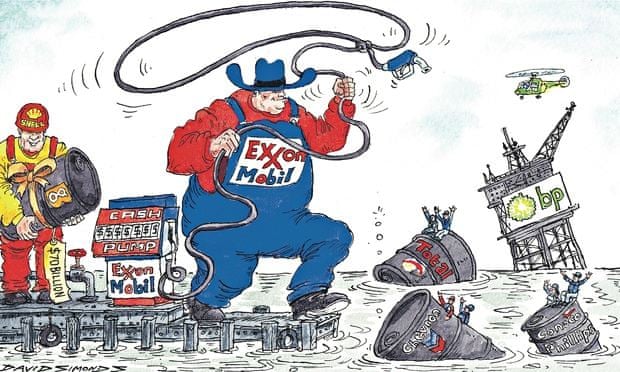The world of Big Oil looks set for another round of mega-mergers and acquisitions after Shell set the ball rolling this week with its $70bn agreement to take over BG.
All eyes are on ExxonMobil. The world’s largest shareholder-funded energy giant has plenty of cash – and opportunities, now that the drop in oil prices has produced an army of willing sellers.
At one of the company’s rare meetings with Wall Street analysts recently, Exxon executives boasted it had a serious call from investment bankers acting on behalf of distressed oil companies looking for a saviour.
Although Brent blend has only recently dived to less than $60 per barrel, from the highs of $115 seen last June, many energy companies are over-extended after a three-year period when they grew fat and over-ambitious, feasting on very high oil prices.
Among the most obvious targets would have been Britain’s former flagship oil group, BP. But the reality is that its continuing legal fallout from the Deepwater Horizon accident in the Gulf of Mexico and its deep involvement in the Russian state oil sector has made it a poisonous pill that few predators would want to ingest.
But there will be endless speculation now about the future of other European energy companies such as Total of France and ENI of Italy, never mind US groups such as Chevron, ConocoPhillips and Anadarko or the plethora of North Sea minnows.
The last round of intense mergers, when Chevron moved on Texaco, Conoco on Phillips and Exxon on Mobil, was triggered by a similar collapse in oil prices at the end of the millennium. It was BP’s then chief executive, John Browne, who set the pace with quick takeovers of first Amoco, followed by Arco and then Castrol.
Oil bosses saw the opportunity of mergers that would enable them both to cut costs through removing jobs and offices and increase their oil reserves without the need for costly exploratory drilling.
The same factors are in play today, but still it has been quite a turnaround for Ben van Beurden and Shell.
The seemingly sober Dutchman succeeded to the top job at the start of last year, promising to slash spending and sell underperforming assets. Barely 12 months later, the Shell lifer has turned into a swashbuckling corporate acquirer, agreeing to take over BG in one of the biggest deals ever seen in the energy sector.
There are still regulatory hurdles to overcome and plenty of analysts are alarmed at the price offered: a 50% premium to the share value.
Shell has been seen in the past as a slow-footed beast that has missed out on some of the big opportunities: not just the mega-mergers of the late 1990s but also the US shale revolution and huge Brazilian deep-water finds.
This time the Anglo-Dutch business has led from the front – as it seems to be doing in the race for the Arctic, with its determination to press ahead with drilling off Alaska despite widespread concern about the impact on the environment.
The takeover of BG can be seen as an opportunity for Shell to bulk up in Brazil; or as a chance to leap to the top of the liquefied natural gas (LNG) market, where BG is predominant; or as a cost-cutting exercise. In fact, it is a bit of everything, and Shell has been linked by the City with the possible acquisition of the former British Gas exploration arm for years. No one had any doubts about the synergies.
Luck and timing are as important in business as in sport or other endeavours, and van Beurden had almost six months from the start of last year to begin his original cost-cutting exercise at Shell before oil asset prices slumped.
Rivals will base their moves partly on what they think will be the future direction of oil prices. If they think the cost of Brent will bounce back shortly, now is the time to pick up those assets on the cheap.
www.theguardian.com

